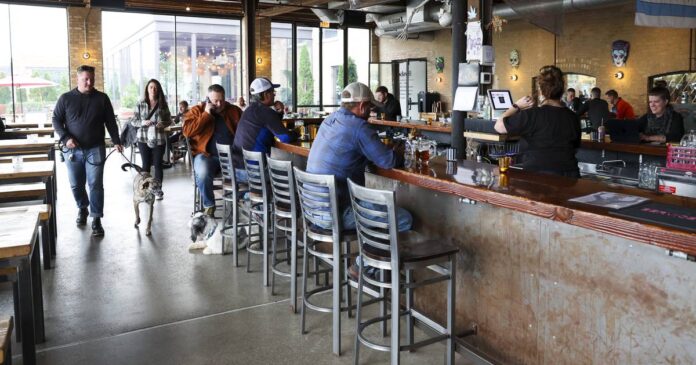After a long battle against bankruptcy and eviction, Metropolitan Brewing is about to raise its final glass.
The beloved German-style brewery will close its doors Dec. 17. For patrons who want to stock up on vanishing favorites, Metropolitan Brewing, known by fans as Metro, will be open every day until then, except Thanksgiving.
Co-founders and owners Doug and Tracy Hurst were “unable to resolve (their) differences with the landlord,” the ex-spouses wrote Tuesday on X, formerly Twitter. Currently, the Hursts have no plans to reopen the brewery in a new location.
“We are deeply sorry that we couldn’t see our way through this current situation,” the Hursts wrote. “We tried. For years. But now it’s time to turn toward new adventures.”
Metro got its start in a Ravenswood warehouse in 2008, expanding to the dog-friendly Avondale brewery and tap room in 2017. Patrons flocked to social media Tuesday to share memories of kayaking up the Chicago River for a pint and letting their pups run loose on the brewery grounds.
With 12 rotating taps and recycled wood tables, the buzzy, boozy space has also played host to Sunday yoga, Wednesday bingo and a rotating menu of tacos from Arigato Market.
“We’re getting a lot of support from all over, and it’s great to have that,” master brewer and co-founder Doug Hurst told the Tribune on Tuesday. “It’s nice that people have fond memories of Metro.”
Metropolitan Brewery filed for Chapter 11 bankruptcy in October, as low retail sales clashed with a yearslong rent payment dispute, the Tribune previously reported.
The brewery owes more than $1 million in equipment rental fees to Live Oak Bank, based in North Carolina, and another $386,000 for a pandemic loan from the Small Business Administration, the Tribune reported.
:quality(70)/cloudfront-us-east-1.images.arcpublishing.com/tronc/L34OR3QC4JBHRKBMKEWJ2WBU64.JPG)
After filing for Chapter 11, staying open would require brewery staff to work with creditors to come to an agreement on a plan to reorganize the business.
The Hursts created a financial plan for how a reorganized brewery could run moving forward. The proposal was rejected this week by landlord Rockwell Properties, Live Oak and the SBA, Doug Hurst said.
“Ultimately, there was not an agreement to be made, particularly with regards to our ability to move forward, and with what the landlord wanted,” Hurst said. “We can’t move forward, so we have to shut down.”
The Tribune found that Metropolitan Brewing owes Rockwell Properties more than $1 million in back rent and fees after a dispute on how much space Metropolitan had agreed to lease. The Hursts stopped paying rent to Rockwell in 2019, alleging they had overpaid by $130,000 since the lease started in 2015.
Rockwell Properties filed a lawsuit to evict the brewery in November 2020. Metro countersued in January 2021, alleging Rockwell had fraudulently inflated the amount of square footage in the brewery’s 15-year lease.
Lawyers for Rockwell Properties were not immediately available for comment Tuesday.
[ Metropolitan Brewing relying on ‘hope’ and negotiations as eviction case ramps up ]
Eviction procedures against Metropolitan Brewery will not continue. Once the brewery closes, its assets will be liquidated to pay off outstanding debts, Doug Hurst said.
Metropolitan Brewing’s final slate of offerings include five year-round beers, most famously Krankshaft, a pale, malty Kölsch-style beer. One of two eleventh-hour specials, a Bavarian-style double bock beer called Generator Doppelbock, took bronze at Chicago’s Festival of Wood and Barrel-Aged Beer less than two weeks ago.
The final Metro beers are currently available in stores across Illinois and Wisconsin. Along with the usual beer by the glass, Metro’s taproom will have an expanded to-go section until Dec. 17, so patrons can claim their own bottles of back inventory.
“The best place to get our beer one last time would be to come to the taproom,” Doug Hurst said.
As the watering hole prepares to tap its kegs for the last time, the Hursts remain proud of Metro’s history in the Chicago craft brewing space, Doug Hurst said.
“We were one of the first three breweries in the new wave of craft brewing in Chicago back in 2007, 2008,” Hurst said. “We’re thankful that we’ve had the support we have had over the years from beer drinkers in Chicago, and it’s been a lot of fun.”



